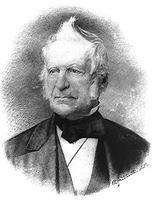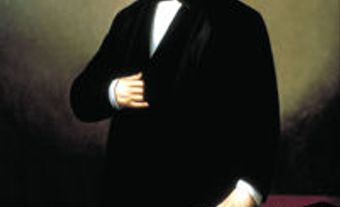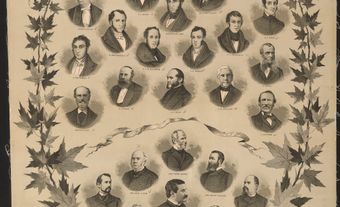Louis-Joseph Papineau, lawyer, seigneur, politician (born 7 October 1786 in Montréal, Province of Quebec; died 23 September 1871 in Montebello, QC). The son of Joseph Papineau, a seigneur and moderate liberal member of the Assembly, Louis-Joseph Papineau was educated at the Petit Séminaire de Québec and prepared himself for a career in law, which he carried on intermittently after 1810. Representative of the growing influence of the liberal professions in French Canada, he was first elected to the Assembly of Lower Canada in 1809, during Governor General Sir James Craig's "Reign of Terror." With his self-assurance, skill as an orator and popular following, he emerged from a group of young nationalists to leadership of the Parti canadien (later Parti patriote) and was made Speaker of the Assembly in 1815.
Papineau came to see himself as the defender of the national heritage of French Canada and led the fight for control of the political institutions of Lower Canada. Early in his career he was a moderate who admired British parliamentary institutions, but during the 1820s his views became more radical and his parliamentary strategy was obstructionist, using the Assembly's control of revenues and the civil list to combat the policies of the English commercial class, which he considered anathema to the interests of French Canada.
Papineau travelled to England in 1823 in his campaign to defeat the Union Bill of 1822, which had been introduced to circumvent his control of the Assembly. The union was rejected and this victory reinforced his desire to reform Lower Canada's political institutions, particularly the council, which was dominated by the Château Clique. Towards 1830 Papineau stepped up his virulent attacks on the nonelective legislative council and declared himself a republican. He became an advocate of independence for Lower Canada and became increasingly critical of imperial authority. After a sweeping electoral victory in 1834, he increased his efforts to paralyse the political system; goaded by revolutionary elements of his party, he intensified his policy of boycott and political obstruction in order to force the British government to grant reforms intended to transfer power to representatives of the French Canadian nation.
Papineau and a small committee put forward their demands in the "Ninety-Two Resolutions," which demanded control of revenues by the legislature, for responsibility of the executive and for election of the council. When the demands were categorically rejected by the British in 1837 the political crisis deepened, popular feeling, inflamed by social and economic crises, was roused and Papineau began to lose control of the events he had been so instrumental in setting in motion. He addressed a rally of 4,000 at St-Charles, 23 October 1837, at which the Patriotes more or less declared the independence of the Six Counties and their willingness to resort to arms if necessary. When after the defeat at St-Charles it became clear that the Patriotes would be crushed, he fled to the United States and, following the failure of the second insurrection, he sailed for France in 1839.
Papineau's career, particularly his behaviour during the Rebellions of 1837, has been a continuing source of controversy and conjecture. He claimed that he had taken no part in the insurrections, yet evidence shows he acted as supreme commander until the battle at St-Denis, from where he disappeared just before the fight was engaged. Later, many of his fellow Patriotes accused him of cowardice, though they continued to support him as the only viable leader of French Canadian nationalism. He professed to be a liberal and republican, yet was a staunch defender of the seigneurial system, which had a feudal character, as the basis of French Canada's agricultural economy. He himself owned the seigneury of Petit Nation, purchased in 1817 from his father, and by all accounts demanded full measure from his habitants. He was an economic conservative, hostile to the commercial and transportation innovations that the merchants considered essential to progress in Lower Canada. Though a deist and anticleric, he nevertheless feared that a weakening of the Catholic Church would play into the hands of the English-speaking Protestant enemies of French Canada.
Papineau was granted amnesty in 1844 and returned from exile to his seigneury in 1845. He profited from timber concessions and built himself a grand manor house at Montebello through the help of his indebted censitaires. He re-entered politics in 1848 but was at odds with the new leadership of Louis LaFontaine. He vehemently opposed the Act of Union and advocated annexation to the United States. Around him coalesced a new group of young liberal nationalists who later became the Parti rouge; Papineau himself left politics in 1854. Complex and contradictory, Papineau was nevertheless the first effective political leader of his people; if he was not the "national hero" they desired, he was a fitting symbol of their discontent.

 Share on Facebook
Share on Facebook Share on X
Share on X Share by Email
Share by Email Share on Google Classroom
Share on Google Classroom



